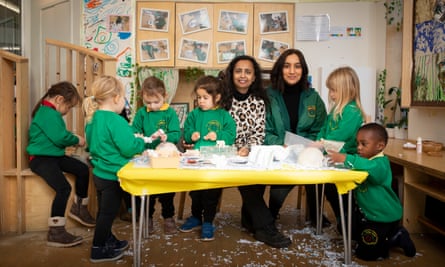One of the UK’s most successful schemes supporting students of Black heritage to get into Oxford and Cambridge universities is expanding to help children as young as three years old to achieve their academic potential.
Target Oxbridge has worked with more than 800 Black British students, of whom more than 350 have secured Oxbridge offers. In 2021, alumni from the scheme made up 24% of the Black British undergraduates starting at the universities.
But the scheme’s founder, Raphael Mokades, when looking back at a decade of personal stories from Target Oxbridge participants, saw evidence that Black British children were experiencing racism and unconscious bias from teachers at such a young age that the scheme needed to be rolled out to a far younger cohort.
“Not every child aged three is going to be Oxbridge potential, but every child aged three deserves to have equal opportunity,” Mokades said. “Right now, while talent may be distributed evenly, opportunity is not. We want to change that.”
Exclusion rates for Black Caribbean students in English schools are up to six times higher than those of their white peers in some local authorities, Guardian analysis has found. Some experts argue that racism in schools is so endemic that it should be treated as a safeguarding issue, pointing to research that shows most Black children have experienced racism in school.
Mokades points to the Sewell report as further evidence of racism being a big factor in the underachievement of Black students. The 2021 report, which was accused of downplaying structural racism, nevertheless found that Black children on free school meals (FSM) starting key stage 1 were ahead of their white and Asian FSM peers. But, by age 16, their achievement is as low as white FSM children and lower than Asian FSM children who started school behind them.
“If you couple this data with what our students are telling us about their school experience, it is pretty clear that while poverty is a massive issue, it isn’t the only issue. Race matters,” Mokades said.
The new project, Hemisphere Education, uses resources including government data, academic research and students’ own life stories to help teachers in nursery settings, primary and secondary schools recognise how they might unconsciously be damaging the academic prospects of Black children under their care.
The one-hour, online Hemisphere course explains how unconscious bias can affect even those who think they are inclusive and the impact it can have on children. Analysis of the scheme’s pilot project has found that more than 90% of users found it useful, while on average each user committed to doing seven things differently as a result of the training.
Nawal Filali, the deputy headteacher at College Green nursery school in Brent, asked some of her staff to trial the programme. She said she was taken aback by how positively it was received. “I was amazed by the way this programme empowered staff members to engage in really honest self-analysis about unconscious bias,” she said.
Wendy Yianni, the school’s headteacher, said the programme gave staff confidence to acknowledge that some racial groups are more likely to have specific challenges. “We have realised we don’t have to pretend to be colour-blind – we can talk about race,” she said.

“We learned that it’s OK to say Black children might face specific challenges, and so we are going to approach all Black children with the intention of going above and beyond for them until they’ve reached a place of equity with the children who don’t face those challenges,” she added.
Silas Edmonds, the head of Ewell Castle school for children aged three to 18, has also trialled the programme. He said teaching unconscious bias to all teachers and children as young as three was vital. “It’s about giving staff the confidence and the tools to call this stuff out and to teach children how they can call it out before they internalise it and start to be affected by it,” he said.
Edmonds said some of his teachers found the course difficult. “There was a level of guilt from those who did the training then said ‘I can’t believe I used to think that or do that’,” he said.
It is vital to start these conversations with teachers of younger children too, said Edmonds. “We need to have explicit conversations with children from a very early age to help them, as they get older, identify when unconscious prejudice creeps in, either in themselves or in others.”
Stay connected with us on social media platform for instant update click here to join our Twitter, & Facebook
We are now on Telegram. Click here to join our channel (@TechiUpdate) and stay updated with the latest Technology headlines.
For all the latest Education News Click Here
